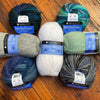Continental Workshop this weekend
Because Emily described this class so succinctly back in 08, I’m just reposting this. But take this class. Seriously. To be able to knit both Continentally and Englishally is tre cool.
There are as many different ways to knit as there are fish in the sea. In fact, if we were to write a mathematical equation, it would be a simple one. If “n” is equal to the number of knitters in the world and “w” is equal to the number of ways to knit, then n=w.
To generalize, though, there are two main ways. In English knitting, most common in America, people knit holding the yarn in their right hand and “throw” the yarn around the needle. In Continental knitting, people hold the yarn in their left hand and “pick” the yarn up by moving the needle. Neither is inherently better than the other – one way usually feels slightly more natural and that’s the one you should use. The general wisdom is that English knitting is easier to learn, while Continental is ultimately faster.
Because English knitting is so much more prevalent ’round these parts, we offer a Continental knitting class for those interested in learning how to do it. But why, you may ask? Well, here are 5 reasons:
- It’s fun to learn new techniques!
- Continental can be faster, especially when switching frequently from knit to purl as for ribbing.
- Being able to do both methods comes in handy for fair isle color work, where you can save tons of time and carry a yarn strand in each hand!
- Continental purling is a bit tricky to learn from a book or even video, so this is one where an in-person class is really helpful.
- Continental is a more efficient method of knitting, requiring the shortest number of specific hand-motions per stitch, so it may be easier on your hands and muscles… so you can knit more!
Continental Knitting Workshop
Saturday, August 29. 3:00 – 5:00 pm.
with Michelle Molis
$20
Materials: Worsted weight yarn and needles to match. Bring to class work on the needles measuring about 40 stitches wide and 2” long.
Skills learned: Continental knitting






